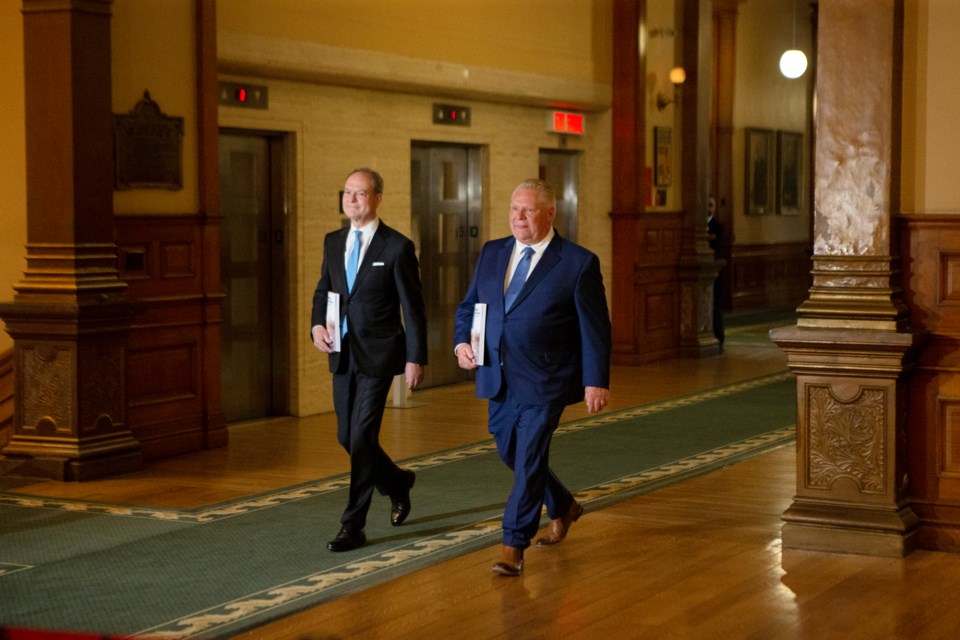When the Ford government and public-sector labour unions go to battle over Bill 124 in court next month, one of the issues they'll spar over is if Ontario was facing a "looming financial crisis" that justified the government's decision to implement its wage-cap legislation back in 2019.
The bill was passed before the pandemic and the looming crisis was, according to the Ford government, the fiscal situation it inherited from the Liberal government — before inflation made constant headlines and the price of chicken made for viral tweets.
The bill, the Protecting a Sustainable Public Sector for Future Generations Act, has been among the Ford government's most contentious acts. Labour groups, opposition parties and others have called on the government to repeal it for years.
It established a three-year window during which most non-union and unionized employees of the Ontario government and broader public sector could bargain for annual wage increases of up to one per cent each year. Affected employees included Ontario's public servants, education sector workers, and hospital and long-term care employees, but not police.
In September 2022, Ontario's Superior Court heard challenges from a variety of labour groups and Superior Court Justice Markus Koehnen declared Bill 124 unconstitutional on the grounds it infringed the Charter right to freedom of association, as it applies to collective bargaining, and the breach was not a reasonable limit under the law.
The government is appealing the decision, arguing the judge erred on both counts: on the issue of collective bargaining rights and in his analysis on whether or not the infringement, if there was one, could be saved by section one of the Charter, which allows for reasonable limits to rights under the law.
That is where the economic argument comes in. Lawyers for the government argue that the judge wrongly required there to be a financial crisis to justify the limits on labour rights.
The court initially heard from two duelling economists, former Bank of Canada Governor David Dodge for the government and Canadian Centre for Policy Alternatives senior economist Sheila Block for the unions. The judge ultimately found Dodge made the case for fiscal prudence and wrote that while that is "a laudable and responsible objective for any government," it cannot be used to justify a breach of Charter rights at any time.
Other cases relied on there being a financial crisis for rights infringements, and Dodge's evidence did not say there was one, the judge said.
In its appeal, the government argues there didn't have to be one — a "looming" one is enough.
"The prudent time to act was before, not upon, a crisis," the lawyers write in their appeal. "Deference must be given to the legislature to take steps to avert a dire financial situation which arises from the 'fundamentally unstable' gap between spending and debt."
In response, the unions maintain that the original judge got it right: there was no crisis and any looming one was the government's own making.
The unions note that the government relied on financial figures it published shortly after taking office, including from the Financial Commission of Inquiry, that seemed to significantly overstate the deficit and had already been revised by the government when it passed Bill 124.
The judge noted the political context.
"It is not uncommon for a new government to disclose with surprise and disappointment that the fiscal situation left by the previous administration was far worse than imagined," he wrote. "This is usually accompanied by a new, more negative assessment of the fiscal situation. When actual results are disclosed in subsequent years, the deficits turn out to be smaller than originally forecast. A positive change which the government of the day attributes to its responsible fiscal management and not to overly negative assessments or projections."
In his decision, Justice Koehnen noted their argument that while the fiscal impact of Bill 124 was to save the government $400 million per year, it announced far more in tax and fee cuts. That is a government's prerogative, the judge wrote, but it never explained why it was necessary. Not only are Ontarians entitled to that explanation, he wrote, but the Charter demands that explanation to demonstrate the justification of the infringement of collective bargaining rights.
The case is set to be argued at the Ontario Court of Appeal on June 20-22.
— With files from Charlie Pinkerton
